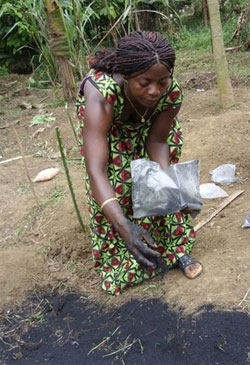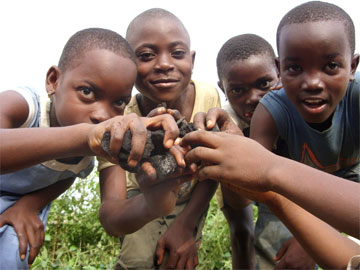Congo biochar initiative wins critical funding to support poverty alleviation, climate change mitigation
An initiative using soil carbon enrichment techniques to boost agricultural yields, alleviate poverty, and protect endangered forests in Central Africa was today selected as one of six projects to win funding under the Congo Basin Forest Fund (CBFF).
The scientific committee of the CBFF awarded Belgium’s Biochar Fund and its Congolese partner ADAPEL €300,000 to implement its biochar concept in 10 villages in the Equateur Province of the Democratic Republic of Congo. The approach improves the fertility of soils through the introduction of “biochar” — charcoal produced from the burning of agricultural residues and waste biomass under reduced oxygen conditions — thereby increasing crop yields and reducing the need to clear forest for slash-and-burn agriculture. The Biochar Fund says the scheme will help address lack of access to clean, renewable energy among poor rural communities while simultaneously cutting emissions from deforestation and forest degradation.
 Farmer applying biochar to a poor soil. Credit: Etchi Daniel-Jones, Laurens Rademakers |
“We are very excited about our successful selection by the CBFF,” said Laurens Rademakers, managing director of Biochar Fund. “It means that the biochar concept is scientifically sound and may help alleviate multiple environmental, social and economic crises amongst the world’s absolute poorest people, while at the same time protecting a unique ecosystem that serves humanity as a whole: the rich forests of the Congo Basin. Moreover, our strategy is innovative because it does not force people out of their traditional livelihoods in the name of conservation, as some other concepts do.”
“Our project may offer a pragmatic way forward to forest conservation, as it looks at the ecosystem from multiple perspectives: the interaction between the pedosphere, the biosphere, the atmosphere and the anthroposphere,” added Amede Daki Bopolo, director of ADAPEL. “The Congolese forest is inhabited by millions of people, and they are the ones who hold the key to its protection and sustainable exploitation. Conserving these forests is also a form of social justice, because the pressures of modernity not only lead to the destruction of the forest, they also marginalize entire communities. Our project may help to turn these pressures around.”
The Biochar Fund says the project was selected by the CBFF for scoring high on its selection criteria:
-
scored very high on the stringent selection criteria: (1) reducing the rate of deforestation in the Congo Basin, (2) alleviating poverty and improving livelihoods of the poorest forest communities, (3) strengthening the capacity of local partners (in this case grassroots farmer organizations in Congo), (4) improving humanity’s knowledge of the forest ecosystem and the factors leading to its alteration (in this case the study of tropical soil dynamics and farming systems which put pressures on the forests), and (5) the presentation of a highly innovative and creative conservation concept.
 Children show charcoal made from palm branches. Credit: Etchi Daniel-Jones, Laurens Rademakers |
The venture hopes to eventually capitalize on the emerging market for carbon credits to generate additional income for communities, which rank among the poorest in the world and suffer from chronic food insecurity.
“The amendment of soils with biochar establishes a permanent, stable and easily measurable carbon sink,” explained a statement from the Biochar Fund. “Char oxidizes over the course of centuries or millennia. Thus, by capturing carbon dioxide from the atmosphere in the farm residues, and by transforming these into a highly recalcitrant form that is sequestered in soils, a low cost and extremely effective type of carbon storage emerges. Carbon credits or other forms of compensation may become available for this effort, opening up a novel source of income for the farmers.”
Christoph Steiner, a professor of Biochemistry and Biorefining at the University of Georgia who provides scientific oversight for the project, says the model could eventually applied to other parts of the world, improving soil fertility and food security, reducing deforestation, and helping mitigate climate change.
“This project of carbon and soil conservation can serve as a model worldwide and displace slash and burn globally,” he explained. “A prerequisite for its sustainable implementation and practice is an access to the global carbon market for the poorest landowners, which requires NGOs such as the Biochar Fund, ADAPEL and the CBFF.”
“The carbon market would provide an incentive to utilize waste biomass and re-growing resources to establish a carbon sink and the means to invest into long-term soil fertility and the recuperation of previously degraded land.”







